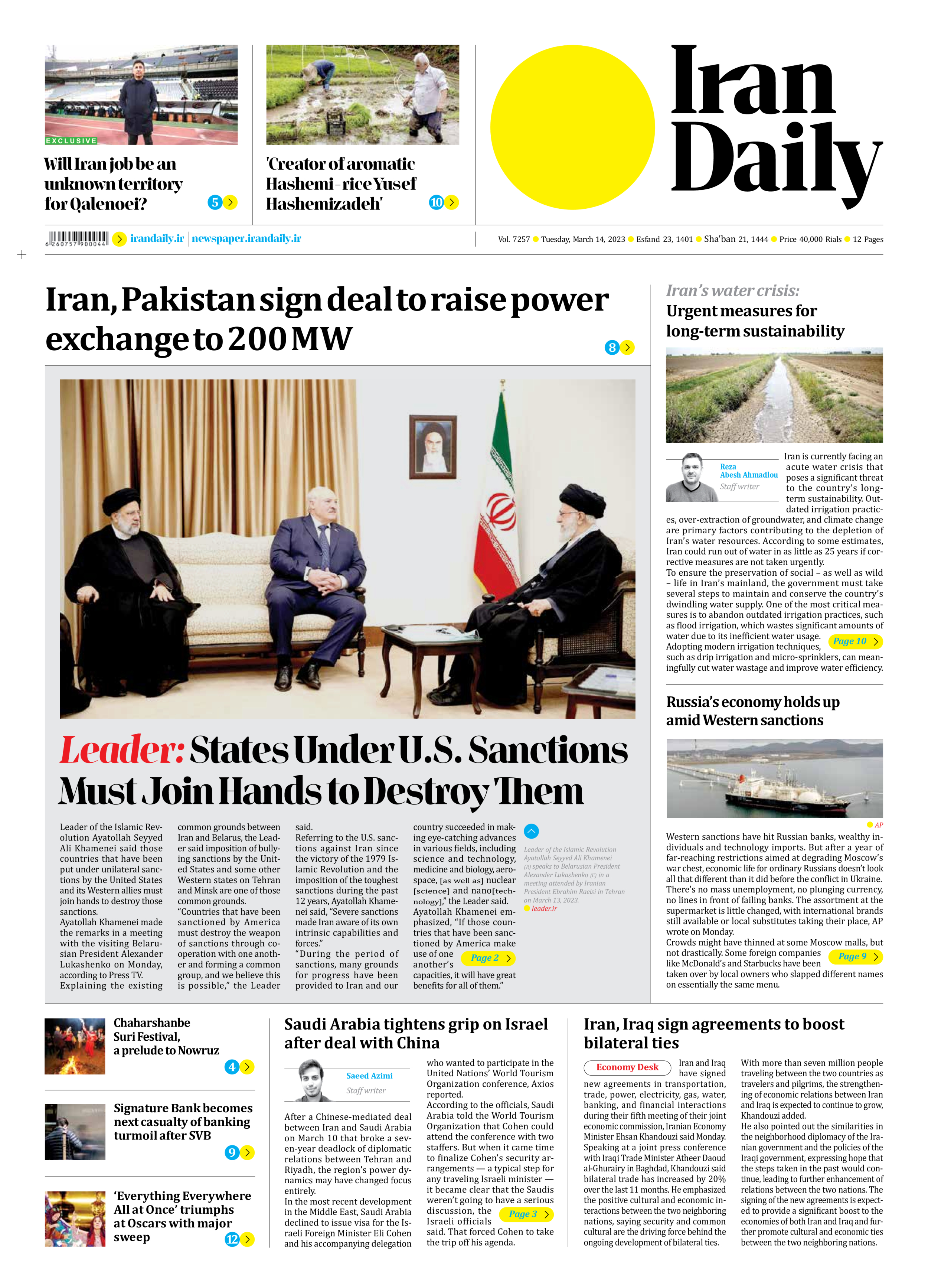
Iran’s water crisis:
Urgent measures for long-term sustainability
Reza Abesh Ahmadlou
Staff writer
Iran is currently facing an acute water crisis that poses a significant threat to the country’s long-term sustainability. Outdated irrigation practices, over-extraction of groundwater, and climate change are primary factors contributing to the depletion of Iran’s water resources. According to some estimates, Iran could run out of water in as little as 25 years if corrective measures are not taken urgently.
To ensure the preservation of social – as well as wild – life in Iran’s mainland, the government must take several steps to maintain and conserve the country’s dwindling water supply. One of the most critical measures is to abandon outdated irrigation practices, such as flood irrigation, which wastes significant amounts of water due to its inefficient water usage. Adopting modern irrigation techniques, such as drip irrigation and micro-sprinklers, can meaningfully cut water wastage and improve water efficiency.
The implementation of smart irrigation systems could also prove to be a feasible solution. These systems use sensors to detect soil moisture levels and adjust irrigation accordingly, thus reducing water wastage and improving irrigation efficiency. The government could provide financial incentives to farmers to encourage the installation of such systems.
Agriculture is a significant contributor to Iran’s water crisis, particularly the production of water-intensive fruits such as watermelon, cantaloupe, and honeydew. To address the issue, the authorities should put limits on such agricultural practices and promote efficient irrigation methods to reduce water usage.
Over-extraction of groundwater is another practice that needs to be immediately halted to maintain Iran’s water reservoirs. The excessive pumping of groundwater has led to significant depletion of aquifers, contributing significantly to Iran’s water crisis. The government must enforce strict regulations to limit groundwater extraction while encouraging farmers to switch to more efficient irrigation methods. Financial incentives could be provided to farmers who switch to modern irrigation methods, while penalties could be imposed on those who continue to overdo groundwater extraction.
In addition to ceasing inefficient practices, several methods could be employed to maintain Iran’s water resources. Rainwater harvesting involves collecting and storing rainwater in tanks, reservoirs, or underground storages, providing a reliable source of water for agriculture and other uses while conserving water resources. Wastewater treatment and reuse can also significantly reduce the pressure on Iran’s freshwater resources. By treating wastewater and reusing it for irrigation, industrial uses, or even drinking water, Iran can significantly reduce water pollution.
Seawater desalination is another potential solution to maintain Iran’s water resources. Iran has abundant seawater resources, making desalination a viable option for providing freshwater. While desalination is an expensive process that requires a significant amount of energy and money, the government has been investing in constructing desalination plants in southern provinces facing severe water scarcity due to their arid climates.
Iran launched a major desalination project near southern Bandar Abbas port eight years ago to quench the thirst of three dry provinces of Hormozgan, Yazd and Kerman via a mega pipeline. The Saqi Kowsar project aims to extract one million cubic meters of freshwater per day from seawater.
The government has carried out and is completing several similar projects in adjacent Sistan and Baluchestan province.
Implementing these solutions will require a substantial investment by the government, which could be financed through a combination of public funds, private investment, and international aid. The scale and scope of the projects will determine the budget required.
In conclusion, Iran’s water crisis is a significant challenge that requires urgent action. Adopting modern water management practices, promoting water conservation, and investing in new water sources such as rainwater harvesting, wastewater treatment, and seawater desalination are crucial measures that must be implemented. It is essential to work together, including the government, farmers, industries, and the public in the process, to ensure sustainable water management practices. By doing so, Iran can preserve its water resources and ensure a secure water supply for its people and economy for a long time to come.







